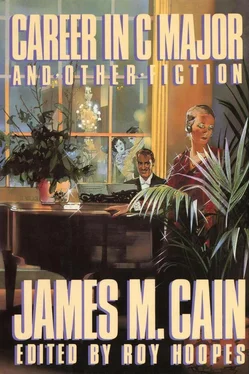The basic story for “Pastorale” [2] “Pastorale” is included in The Baby in the Icebox and Other Short Fiction by James M. Cain, Holt, Rinehart and Winston, 1981; Penguin, 1984.
was given to him by William Gilbert Patton, who wrote the Frank Merriwell books under the pseudonym Burt L. Standish. Cain had profiled Patton for the Saturday Evening Post, and during his interview Patton told him a story about two western roughnecks who had cut off the head of an old man but were distraught when the head rolled around in their wagon as they were driving away from the scene of the crime. Much to Patton’s surprise, Cain thought the story hilarious and asked Patton if he could use it sometime. Patton said yes, and Cain transferred the story to the Eastern Shore and had it happen to a couple of yokels, who, by now, had become Cain’s favorite characters for his dialogues.Briefly, “Pastorale” concerns a young rube named Burbie who returns to his Eastern Shore hometown to find his high school girlfriend, Lida, married to an old man who is presumed to have a fortune hidden in their house. Burbie, with a friend named Hutch, hatches a scheme to kill the old man and steal the money; he then arranges for Lida (who is in on the scheme) to be away for an evening while Burbie and Hutch carry out the grisly crime. But after the two country rubes kill the old man, they find he has only $20 hidden away. So they bury him in a shallow grave down the road from his house, all the while arguing about what they ought to do next — an argument which is intensified by the corn liquor they start drinking on the way back to town. After Burbie and Hutch are high on the liquor, they decide the only way to pay back Lida for giving them the misinformation that led to the death of her husband is to cut the old man’s head off and present it to her as a present. After cutting the old man’s head off with a shovel, they start back to town on a wild, drunken ride. It is a cold, wintry night, and as he gets drunker, Hutch starts yelling and screaming and the old man’s head rolls around in the back of the wagon, just as it had done in Patton’s western story. They finally reach a creek, which has a slight crust of ice on it, and Burbie takes the opportunity to throw the head into the creek, hoping it will break the ice and sink into the water. Instead, it goes sliding across the ice in the moonlight, which panics Hutch, who threatens to kill Burbie. So Burbie leaps out of the wagon and runs away; then he hears a loud crack, like a pistol shot. It is the sound of the wagon sinking into the creek after Hutch had tried to make the horse cross it. The next morning, Hutch is found drowned and the sheriff decides Hutch robbed the old man and killed him. The rest of the story is Cain’s explanation of what happens to Burbie and Lida, who had killed an old man and gotten away with it — just as Frank and Cora would kill Nick in Postman and get away with it.
The significance of “Pastorale” is that, despite its theme of murder and guilt, it was essentially a burlesque — not unconscious burlesque, as Wilson says of Postman , but burlesque pure and simple. “Pastorale” was never in danger of becoming unintentionally funny — it was hilarious from the beginning and Cain fully intended it that way.
When The World folded, Cain went to work for Harold Ross on The New Yorker, where he found, to no one’s surprise, that his brand of humor was not The New Yorker’s. His only contribution to The New Yorker , other than two light verses, was the little sketch entitled “Sealing Wax.”
With the documents finally fitted into a stout clasp envelope, addressed to “The Hon. Secretary of Labor, Washington, D.C.,” I made my way to the registry window of the City Hall branch of the Post Office, and confronted Mr. A. T. Murray. Mr. Murray and I are old friends, or at any rate we have seen quite a lot of each other, as I often have to register things.
“Will you lend me the sealing wax?” I said.
“The Department,” he answered, “don’t furnish sealing wax any more.”
“They used to furnish it,” I said.
“They used to furnish it,” he said, “but they don’t furnish it any more.”
This was annoying, for as I say it was a clasp envelope and I knew of old that you can’t register a thing like that, which anybody can open.
“Where’s the nearest place I can buy sealing wax?” I said.
“There’s a stationery store on Nassau Street,” said Mr. Murray.
To Nassau Street I trudged; it was beginning to rain, and that didn’t improve my opinion of the Post Office Department of the United States Government. On my way I got to thinking about it: I made up my mind that this kind of thing had to stop. I would write a piece about it, an indignant letter to the Herald Tribune , and say: “How about this, Mr. Brown?” Mr. Brown, in case you haven’t heard, is Postmaster General of the United States — Mr. Walter F. Brown of Ohio. I computed roughly the cost of sealing wax, bought wholesale; I planned how to balance this trifling cost against the inconvenience to citizens who are forced to walk down to Nassau Street in the rain.
Nassau Street, it turned out, was full of stationery stores, but the first five didn’t handle sealing wax. “No demand,” said one salesman briefly.
“How about people that have things to register,” I inquired sarcastically, “and who, by reason of the fact that the Post Office Department doesn’t furnish sealing wax any more, must trudge down to Nassau Street?”
“By me, buddy,” he said. “Them people don’t come in this store.”
Finally I found a store that handled sealing wax. It was the best sealing wax I ever saw: it had a wick running down the middle, like a candle, and all you had to do was light the wick and let the wax drop down on the envelope. This did away with the old fumbling with matches. On my way back I determined to give a free reading notice in the letter to the manufacturers of this sealing wax: Davids Brothers, of 213 Centre Street. You see I was going to compare the brilliant originality of Davids Brothers with the dull stupidity of the Post Office Department. (“Is this the vaunted efficiency of the Hoover Administration, Mr. Brown?”) Then a really brilliant idea hit me: I would demand that sealing-wax machines, exactly like chewing-gum machines, be installed in all Post Offices.
In this frame of mind, I entered the registry room again, lighted the wick, made three thick puddles of sealing wax on the envelope, and grimly confronted Mr. Murray.
“We can’t take that,” said Mr. Murray. “You got to have mucilage under that flap.”
I opened my mouth to roar very loud: “And I suppose I’ve got to go down to Nassau Street for a bottle of mucilage now, have I?” But I noticed that Mr. Murray was pushing a bottle of mucilage at me. I took it, went back to the table, put mucilage under the flap, and then went back to Mr. Murray. I would wait, I thought, until he got through with the formalities of registry before telling him what I thought of a government that furnished mucilage but did not furnish sealing wax.
Mr. Murray stamped the envelope with his usual care, turned it over, looked at it thoughtfully. Then, as he handed out the receipt, he leaned toward me.
“Now get this,” he said. “Get this straight, so you’ll know how to do in the future. The sealing wax on a thing like this is not essential. But the mucilage is .”
(
The New Yorker , May 2, 1931)
Within nine months, Cain had said goodbye to Ross and The New Yorker and New York and was on his way to California and a 17-year career as an unsuccessful screenwriter and enormously successful writer of best-selling controversial novels. But he had learned several important things in New York: He found that he wrote best about man’s essential nature and needs — greed, sex, passion, food, and music — in addition to understanding and sympathizing with his fascination with animals. He also learned that he wrote best when he pretended to be someone else — even the “corporate awfulness” of the newspaper, which he called the anonymous voice of the editorial page. He could write dialogue and tell a story, if he did the same thing he did on the editorial page. “The only way I can keep on track,” he said, “is to pretend to be somebody else — to put it in dialect and thus get it told. If I try to do it in my own language I find I have none... So long as I merely report what people might have said under certain circumstances, I am all right, but the moment I have to step in and be myself... then I’m sunk.”
Читать дальше












